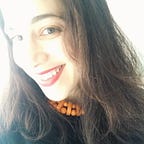Chapter 16: The Cruelest Month
One night in a cabin perched above a river, tucked away in a forest thick with redwoods and ferns, I let go.
Here is what I have learned about myself: I am rarely able to relinquish control.
Because I am human, I am not alone in this.
It is easy to point to those who you think are controlling, and far harder to examine in yourself what it is you do to maintain control. We all do it, try to control our lives and our situations, nearly everyone. We try and accomplish this by any means necessary. We withdraw or we try to get closer. We find fault in others or in ourselves. We want to fix and find answers. We want to do anything that allows us to make sense of a senseless situation, to create a narrative that does not end mid-sentence, to escape the pain we feel by reasoning our way out.
I am not someone who pulls away or withdraws affection to protect myself. I am a fixer, one who moves ever deeper into the heart of the problem. Sometimes the fixing becomes a fixation, as if I have taken on someone else’s trouble and made it my own. In a bookstore years ago, I looked at a book that described the days of the year, and traits of the person born on each day. My birthday was the “day of problem solver.” I read the description and laughed at how true it was, paid minimal attention to the words, and carried the title with me for a long time, tucked somewhere in a story about myself.
One morning I looked up the book, curious if the descriptions were online. I skipped past the title and read the description, felt a prickle on my neck as I realized how deeply the words unsettled me. How many times had I seen a lover’s limitations as something to fix, something full of potential, rather than something to understand as the present. All those times I wanted to get to the future, where things had to be better, not stay still in the moment and look at things exactly as they were.
Where was the divide between helping and being hurt? Which part was taking care of someone and which was refusing to care for myself? I no longer wanted to be enmeshed others, focused on another person to my own detriment. How many times had I ignored myself and my needs, had thought someone else could deliver me if only we — not me — could get things just right? I wondered, uncomfortably, if in trying to solve problems I had only created more.
My eyes returned to the title. “REFORMED PROBLEM SOLVER,” it declared. I thought about the word “reformed,” picked it apart, examined its pieces. Could I reform, become reformed, re-form myself into a person who could give more space and relinquish control? Or was the reformation in acceptance?
In the redwoods I stopped trying to escape the loneliness and despair. I stopped trying to fix it, myself, anyone else. I let it engulf me, let the blackest feelings rise up.
I should have waited, I thought to myself. I should have stayed and been patient. I should have given more space, I should have needed less, I should have needed differently.
For an hour I floated in that dark murkiness. I lost track of everything but remorse, self-recrimination, blame, anger, sorrow, and the fire that had long since burned out. I felt ugly and untethered. Unlovable.
And then in an instant the fog cleared, as if a strong wind had blown in from the west. I felt shaky but strangely lucid. I looked outside. In the darkness I could see the faint outlines of redwoods, shadows of the trees I had imagined I would leave behind. I inhaled the scent of the fire and night air. For a moment I felt at home. Not in California, not in someone else, not anywhere but in the truth of myself.
